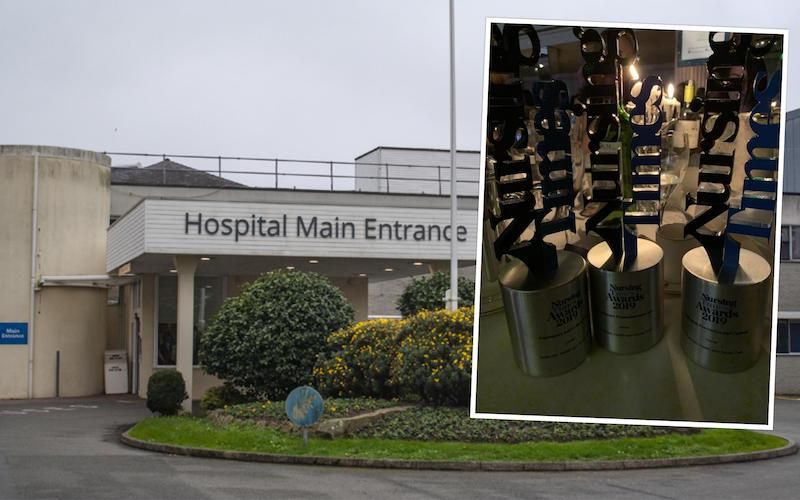


A team of nurses from HSC have been awarded three Nursing Times awards following a rigorous judging process.
These awards recognise and celebrate exceptional achievements across the nursing profession.
@CiqniN @JulietBeal @HeidiSoulsby @AnnaMilanec @gillmabbett @AlisonPlace2 @MissellieJoan @burgessinfected @smick5123 @SMundy68 @lottie_barnes Guernsey rocked the awards a hat trip. Won all 3 categories, can not believe it. Well done everyone pic.twitter.com/JUeqAaTNwJ
— Patricia McDermott (@pmcdermott2035) October 30, 2019
The HSC Emergency Department and Urology team won the awards due to the exceptional innovation and best practice demonstrated in their application and presentation to the judges. The awards won by HSC are as follows:
Continence Promotion and Care
Emergency and Critical Care
Infection Prevention and Control
What started as a discussion between the teams about how to enhance the experience of patients who present to the Emergency Department in retention of urine, has resulted in national recognition for an innovative project that can be shared widely with nursing colleagues in the UK and across the globe.
Guernsey’s Health and Social Care teams scooped three awards at the 2019 @NursingTimes Awards.
— HSCJobsGuernsey (@HSCJobsGuernsey) October 31, 2019
They were crowned winners in Emergency and Critical Care, Infection Prevention and Control and Continence Promotion and Care.
More about joining our teams here: https://t.co/l4WnBhT9zT pic.twitter.com/c4aTejmZqm
In 2013, staff from the Urology service and the Emergency Department (ED) began discussions about the impact indwelling urinary catheters had on patients. Historically, patients with acute urinary retention who attended the ED had an indwelling urinary catheter, discharged and referred to the community nurses and the urological clinical nurses for follow up and ‘trial without catheter’. These catheters could remain in place for up to 3 weeks which increased the risk of infection, pain and discomfort.
If the ‘trial without catheter’ failed, patients were then taught clean intermittent self- catheterisation and many patients asked why they were not taught this at the start. This promoted a change in practice and all ED staff were trained to identify those patients for whom this technique was suitable and to then teach the procedure to the patient – increasing patient satisfaction and dignity and reducing infections and discomfort. Years on and a pathway has been developed and tested and all ED staff have been trained in how to teach patients the self-catheterisation process. Patients now leave the ED with a self-managing tool and are then followed up by the Urology Team.
Wow! Amazing guys. So proud. https://t.co/rLrFyPALiX
— Heidi Soulsby (@HeidiSoulsby) October 30, 2019
HSC has seen significant benefits from this innovative project including reduction in infection rates, hospital admissions and fewer resources being needed in terms of catheterisation kits required. The main benefits are to the patients. No longer are they reliant on an indwelling urinary catheter for up to 3 weeks (which can impact on their ability to work, participate in family and social life etc).
This innovative project puts the user at the centre of the care they receive. It has been a collaborative approach to transforming a service between the ED and the Urology team – an approach that is at the heart of the Partnership of Purpose.
Pictured top: An image of the awards from Patricia McDermott's Twitter inset over the PEH.
Comments
Comments on this story express the views of the commentator only, not Bailiwick Publishing. We are unable to guarantee the accuracy of any of those comments.